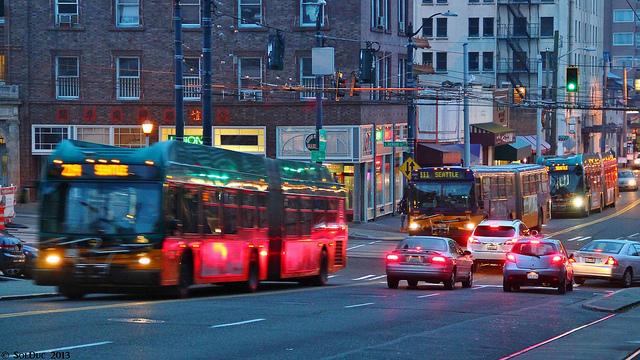
Securing revenue is the most critical step to improve transit in Seattle. The city has a long history of trying to build transit, from streetcars that were ultimately dismantled to the monorail project. Both the aforementioned examples largely failed because of funding problems. If we are serious about improving transit we need to reject the philosophy that we will get the best government by first cutting revenue. Additionally, we need to avoid the trap of trying to find an ideal funding method, that can’t immediately be implemented. If we support a progressive Seattle with better infrastructure and service, we need to increase revenue now.
Progressive Revenue Increases
Increasing revenue for transit is fundamentally a progressive cause. Collecting and disbursing money acknowledges that we can work together towards a better Seattle; that we are interdependent and live in a society. It is clear that residents within the city of Seattle overwhelmingly agree spending money on transit is the right way forward.
Before suggesting there are better solutions it is important to know how we got where we are and what the alternatives are. You can read a brief history here. In summary, campaigns to defund government over the last few decades have incrementally increased the vulnerability of transit funding. It is now dependent on sales taxes and state politics, both of which collapsed in the last few years. Given the current tax situation in Washington state, Seattle is extremely limited in how it can raise funds, especially before September.
To adopt a progressive solution, we must balance sharing this burden among the largest group possible while also having those with wealth pay more. A small increase in property taxes is our best solution. This initiative would require people and businesses to pay two dimes and two pennies for every $1,000 of wealth they own in property. This tax is a percentage, meaning middle class and low income families owning property would pay much less than people or businesses with million dollar homes and buildings. No other tax schemes could be implemented as quickly, spread as widely, address wealth inequities and have a legitimate chance of passing.
Towards A Long Term Solution
As mentioned before, this vote is not just about maintaining service. There are three big picture benefits if this initiative succeeds.
First, it will overturn the cynical and negative message from the April 22nd election; King County, the most transit supportive and bus dependent county in the state, rejected additional funding. Legislators are not passive observers of this outcome. Elections test support for policy and most big policy changes begin with small victories. We must demonstrate that Seattle wants transit supportive legislators. Voting yes on Plan C will be the best way to rectify this mistaken message and prove Seattle supports transit.
Second, it is impossible to rally people behind a long term solution until we stop the bleeding. Transit supporters are not a big enough advocacy group to split our efforts between many different pursuits. Improving service will require the support of those that are currently engaged because they need to save their bus while increasing engagement by increasing ridership. Funding buses in Seattle is necessary for supporters to coalesce behind bigger projects in the future.
Lastly, more state funding is absolutely critical. We wouldn’t be in this situation if the state legislature hadn’t failed to fund transit. Securing funding in the state legislature proved to be insurmountable this year because many state senators aren’t affected by cuts. Seattle representatives cannot secure funding alone. They must cut deals and they desperately need more leverage. Seattle residents can help with this by increasing locally raised revenue and spending. It is a perverse reality of politics that if we aren’t desperate, we can negotiate for more.
We must support a better city by funding transit and growing ridership. Supporting Plan C is the progressive solution and the first step to the next big transit projects.
Passing this initiative will require a lot of effort, mostly by volunteers. If you’d like to help, you can sign up online. If you have questions about this effort, you can direct those to info@theurbanist.org.

Owen Pickford
Owen is a solutions engineer for a software company. He has an amateur interest in urban policy, focusing on housing. His primary mode is a bicycle but isn't ashamed of riding down the hill and taking the bus back up. Feel free to tweet at him: @pickovven.


